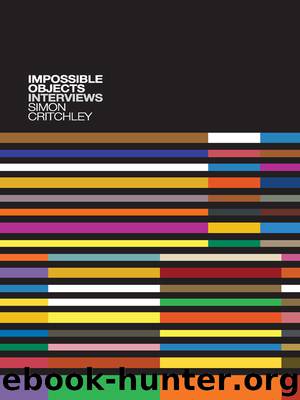Impossible Objects by Cederstrom Carl Critchley Simon Kesselman Todd

Author:Cederstrom, Carl, Critchley , Simon, Kesselman, Todd
Language: eng
Format: epub
Publisher: Wiley
6 Language and Murder
* * *
Blanchot, Stevens, and the Literary
Tom McCarthy, Penny McCarthy, Anthony Auerbach, Victoria Scott, and Paul Perry for the International Necronautical Society
AUSTRIAN CULTURAL INSTITUTE, LONDON, MARCH 2001
This sixth interview was Critchley’s first exchange with the artist and novelist Tom McCarthy (who was recently short-listed for the Booker Prize). “This was a fateful encounter,” Critchley explains. General Secretary McCarthy and his fellow members of the International Necronautical Society (INS) – a semi-fictitious art collective, exploring death – had turned the Austrian Cultural Forum into an interrogation room, and Simon was one of the first in a series of cultural figures who was hauled up in front of the committee. About six months later, Simon was invited to become INS’s Chief Philosopher. “I thought that Tom was brilliant, and we became really close friends very quickly. We began to write together, first on Joyce, then on Shakespeare.”
The interview covers a wide range of literary and philosophical references, from Ponge and Stevens to Blanchot to Bataille. One of the central topics raised is materiality and its relation to language. Is language murder, as Blanchot says, or can we remain attentive and receptive to the objects we set out to describe, such that they can keep on “living,” or persisting in their singularity and particularity? Ponge and Stevens are of interest in this regard as each is sensitive to language; they both avoid a corruption or annihilation of their objects of interest. Apart from investigations into poetry, this discussion also goes into the relation between humor and the Holocaust. While this might first appear an unlikely coupling, their suture arrives in the work of Beckett, the definitive literary hero for both Critchley and McCarthy.
TOM MCCARTHY: You write in your book Very Little … Almost Nothing that the task of philosophical modernity is the thinking through of the first death, the über-death, which is the death of God. So my first question is what is the meaning of this death?
SIMON CRITCHLEY: It’s a big question. Nietzsche said “God is dead,” and that’s written on toilet walls all over the world. But he then went on to say: “And we have killed him.” So modernity, by which I mean that social, economic, and intellectual process that begins in the early seventeenth century, culminates in the fact that we no longer require God as a metaphysical underpinning for our beliefs. So the death of God is part of a historical process. And philosophy, at a certain point – it’s arguable when that starts – also shifts its emphasis. In medieval philosophy, human beings were creatures, and all creatures were dependent on a creator who was himself uncreated, the self-caused cause of everything, a causa sui. So God was at the center of the web, holding the universe together. With the advent of the modern world, that focus moves to the human subject – so that for someone like Descartes, the first point of certainty in a philosophical system is no longer the existence of God but the existence of the self.
Download
This site does not store any files on its server. We only index and link to content provided by other sites. Please contact the content providers to delete copyright contents if any and email us, we'll remove relevant links or contents immediately.
The remains of the day by Kazuo Ishiguro(8338)
Tools of Titans by Timothy Ferriss(7737)
Giovanni's Room by James Baldwin(6747)
The Black Swan by Nassim Nicholas Taleb(6719)
Inner Engineering: A Yogi's Guide to Joy by Sadhguru(6404)
The Way of Zen by Alan W. Watts(6253)
Asking the Right Questions: A Guide to Critical Thinking by M. Neil Browne & Stuart M. Keeley(5319)
The Power of Now: A Guide to Spiritual Enlightenment by Eckhart Tolle(5291)
The Six Wives Of Henry VIII (WOMEN IN HISTORY) by Fraser Antonia(5197)
Astrophysics for People in a Hurry by Neil DeGrasse Tyson(4973)
12 Rules for Life by Jordan B. Peterson(4138)
Housekeeping by Marilynne Robinson(4016)
The Ethical Slut by Janet W. Hardy(4008)
Skin in the Game by Nassim Nicholas Taleb(3941)
Double Down (Diary of a Wimpy Kid Book 11) by Jeff Kinney(3873)
Ikigai by Héctor García & Francesc Miralles(3829)
The Art of Happiness by The Dalai Lama(3817)
Skin in the Game: Hidden Asymmetries in Daily Life by Nassim Nicholas Taleb(3695)
Walking by Henry David Thoreau(3658)
